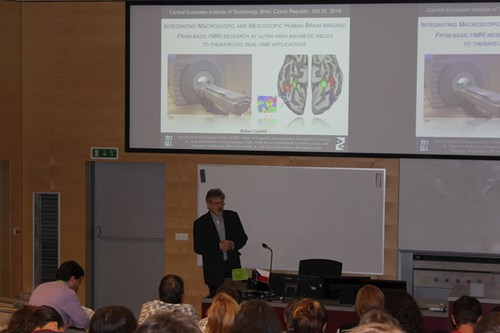About the lecture
Functional brain imaging has substantially contributed to our understanding of specialised areas and large-scale networks in the human brain. This has also allowed "brain reading" applications relating distributed activity patterns to mental states. We will describe recent real-time brain reading applications that provide new therapeutic applications of fMRI. More specifically, we will describe that fMRI neurofeedback has been successfully used to reduce symptoms in depression and Parkinson's disease, and how a communication brain computer interface allows "locked-in" patients to communicate solely based on evoked spatio-temporal activity patterns. While successful, fMRI currently targets a level of resolution that does not allow inferring the sub-categorical feature representations used by the brain. In the second part of the talk, we will argue that understanding mesoscopic functional organizations within brain areas is now in reach when using ultra-high magnetic field scanners (7 Tesla and higher). These devices allow sub-millimeter functional resolution opening the possibility to study the human brain at the level of cortical columns and cortical layers. Recent human fMRI studies at 7 Tesla have indeed been able to reveal columnar-level organizations in the visual areas V1, V5 and A1. Furthermore, we could relate conscious perceptual switches of ambiguous stimuli to dynamic activation changes of specific feature codes in area hMT, and top-down attention effects at different layers in V1 and A1. Combined with advanced neural network modelling, these studies are first important steps that help to clarify how the human mind emerges from feature representations and their interactions in the human brain.
